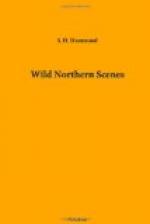“I have no children of my own,” remarked Smith, “and, therefore, may not be regarded as the best authority in regard to the manner of treating, or rearing children; but I have often wondered at the very great mistakes people sometimes make in regard to them. There are parents who mean no wrong, and yet who make no scruple of deceiving them in reply to their simple questionings, forgetting, or regardless of the fact, that a false answer to their innocent inquiries put in good faith, and in the earnest pursuit of truth, may plant an error in their minds, which may take years of experience, and often a painful amount of ridicule to eradicate. I knew a little boy years ago, a thoughtful, philosophic child, who speculated in his simplicity upon what he saw, as great philosophers do, in their wisdom, upon the various phenomena of Nature. His father, had a great barn, above which, as was the fashion long ago, perched upon a staff, a few feet above the ridgepole, was a weather-cock, fashioned out of a piece of board in the shape of a rooster. ‘Father,’ said the little boy, one day, ’what makes that rooster always point his head one way when the cold wind blows, and the other way when it is warm and pleasant?’ ’He always looks towards the place where the wind comes from,’ replied the father; ’when he gets too warm, and the sun is too hot for him, he turns his tail to the south, and the north wind is sure to come down, cold and chill, to cool him off.’ ’Does he call the cold wind, father, and will it come when he looks, that way?’ was the next inquiry. ‘Certainly,’ replied his father, carelessly. That was a wrong and a foolish answer.
“That little boy, relying in his simple faith upon the wisdom and truthfulness of his father, believed for a long time, that the weathercock on the top of the barn, could bring the cold north, or the warm south wind, by turning upon its perch. He was cured of his error only by being laughed at for his simplicity. Parents should never deceive their children by a careless or a wrong answer to the simple questions put to them by these little searchers after knowledge.”
“I remember,” said the doctor, “and it is one of the earliest incidents which my recollection has treasured, that I was out one evening in autumn, with a boy older than myself, gathering hazel nuts. The sun had sunk behind the hills, and the shadows of twilight were gathering in the valley. It was a beautiful and calm evening, the solemn stillness of which, was only broken by the ‘tza! tza!’ of thousands of katydids among the bushes. I asked my companion what it was that made the noise I heard, and he, supposing that I referred to sounds that came up occasionally from the lake, after listening for a moment, answered that it was made by the wild geese. In my simplicity I believed it, and it was not until I caught, the next season, a katydid while it was in the act of singing, that I discovered that the music among the hazel bushes was not made by the wild geese.”




